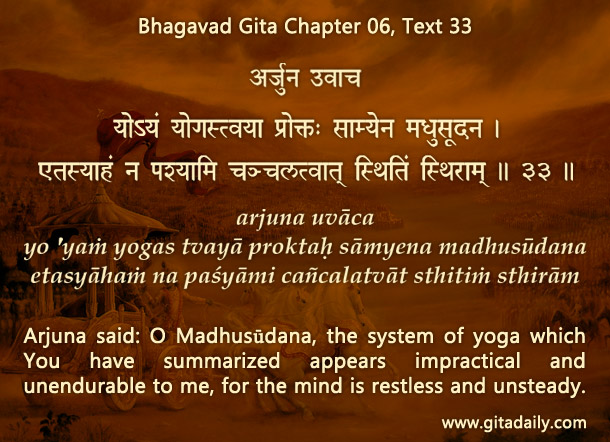The Bhagavad-gita (06.33) indicates that the mind’s steady situation (sthithim sthiram) is to be unsteady (cancalatvat). The mind likes one thing today, dislikes it tomorrow and re-likes it the day after tomorrow.
If we let our mind’s moods determine our life’s decisions, we won’t be able to do anything worthwhile. Why not? Because our mind will soon make us feel that even the most worthwhile things are not worth our while.
How, then, can we stick to worthwhile things? We need to stop expecting our mind to be steady and start expecting it to be unsteady. That is, we need to prepare ourselves in advance for the eventuality that the things we consider worthwhile today won’t seem worthwhile tomorrow. If we expect our mind to be steadily motivated, we will set ourselves up for a nasty surprise. Instead, if we expect it to over time become demotivated, we will create resources that will help us persevere: resources such as cogent statements that remind us why that thing is important for us; and trusted friends who act as our accountability partners.
Once we gird ourselves to persist, we will find that the mind’s steady unsteadiness may even work for us instead of against us. How? Its apathy or aversion to worthwhile things will also be temporary. Moreover, if we persist in worthwhile things, our mind will gradually become more receptive, even appreciative, of the worth of those things, especially when the results of our persistence start becoming evident. Or in the Gita’s poetic language, when we survive the initial poison phase of worthwhile things, we will reach and relish their eventual nectar phase (18.37). When we thus learn to expertly deal with our mind’s steady unsteadiness, our life will become increasingly meaningful, fruitful and joyful.
One-sentence summary:
Whenever we try to do anything worthwhile, if we expect our mind to be unsteady, we can equip ourselves to endure its unfavorable phases and thus succeed in doing worthwhile things.
Think it over:
- The mind is steadily unsteady — what does this mean?
- Given our mind’s unsteadiness, how can we persist in doing worthwhile things?
- How may our mind’s unsteadiness work for us instead of against us?
***
06.33: Arjuna said: O Madhusudana, the system of yoga which You have summarized appears impractical and unendurable to me, for the mind is restless and unsteady.
To know more about this verse, please click on the image


Leave A Comment